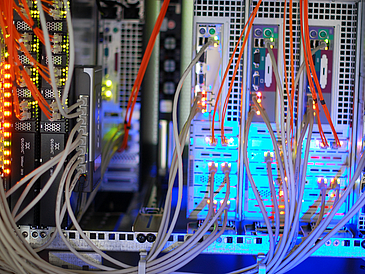The path from a research laboratory prototype to the market is difficult and takes time and the step to operational implementation, especially in small and medium-sized enterprises (SME), is carried out too seldom. The research and technology platform “ecoKI” is to deconstruct obstacles and accelerate processes. The project focuses on the transfer of knowledge and developments from publicly funded research.
The aim of the partners: Bundling knowledge of digitalization and AI methods, especially machine learning, and making it simple and accessible, building up further knowledge, and connecting specialists with users in order to enable a low-threshold and quick start to the usage of new energy-efficiency-increasing technologies.
Permanently Available Solutions
Permanently available, expandable solutions are to be created - both with the platform itself and via the thus generated implementation of individual projects in the companies with the aim of increasing energy efficiency. Additionally, the project partners expect to come across new issues and further information about the industry’s needs thanks to their research.
One of the main tasks in the ecoKI project is the creation and organization of the platform as the basis for a long-term, functional business model. The second task is the development of standard components for the platforms that are to function as a knowledge basis for users and be used for new tasks. Enterprises are to receive support for the further development of their processes in a cost-effective and efficient manner using AI from the modules that are implemented in the platform and are reusable. Synergies from different application cases are also to be usable.
The economic perspectives of the project have a long-term strategical approach and are rooted in the - thanks to ecoKI - improved cooperation between developers and users of innovative AI technologies in companies in the future.
With CRISP-DM, Rigorous Models, and Machine Learning
The project partners are implementing the CRISP-DM method (Cross Industry Standard Process for Data Mining) for the collection, processing, and usage of all data. This is a reliable, standardized process model with which a uniform approach in the development of data mining processes can be attained in order to recognize trends and connections. In terms of the development of generic modules for the platform, the project also looks at so-called rigorous models and - in the field of artificial intelligence - deep learning, a sub-field of machine learning.
Rigorous models generate a technical mechanism with exact scientific methodology. They have the advantage of being able to understand processes that they have simulated more precisely. In contrast to formalized specialist knowledge, machine learning focuses on the automated creation of prediction models that are only based on data. The implementation of machine learning has increased rapidly in the past years, especially due to the development of deep learning approaches and their successful usage.
The ecoKI Project
At the “Steigerung der Energieeffizienz in der Produktion durch Digitalisierung und KI” workshop, which was initiated by BIBA - Bremen Institute for Production and Logistics GmbH, and at which some of the participants included Federal Ministry for Economic Affairs and Energy (BMWi) representatives and the project sponsor Jülich (PtJ), the idea for the realization of a research and technology platform and network structure addressing the issues of sustainable energy efficiency arose. The platform is to especially make R&D results more easily accessible and support the usage for SME.
Alongside BIBA as the coordinating institute, the partners include the German Research Center for Artificial Intelligence (DFKI) in Kaiserslautern, the Institut für Neuroinformatik (INI) at the Ruhr-Universität Bochum, and the Chair of Process Control Systems at the TU Dresden. The four-year project will end on November 30, 2024. It is being funded by the BMWi as part of the government’s 7th Energy Research Campaign and is being supervised by the project sponsor Jülich (PtJ).
Sabine Nollmann
Note for editors:
Press release photos are available at www.biba.uni-bremen.de/presse/pressemitteilungen/2021/pressemitteilung-vom-16-juni-2021.html
Further Information:
www.ecoki.de
www.biba.uni-bremen.de/en
www.dfki.de/en/web
www.ini.rub.de
https://tu-dresden.de/ing/elektrotechnik/ifa/plt
www.uni-bremen.de/en
Contact:
Prof. Dr.-Ing. habil. Klaus-Dieter Thoben
Institute Director
BIBA - Bremen Institute for Production and Logistics GmbH
Phone: +49 421 218-50005
E-Mail: thoprotect me ?!biba.uni-bremenprotect me ?!.de

